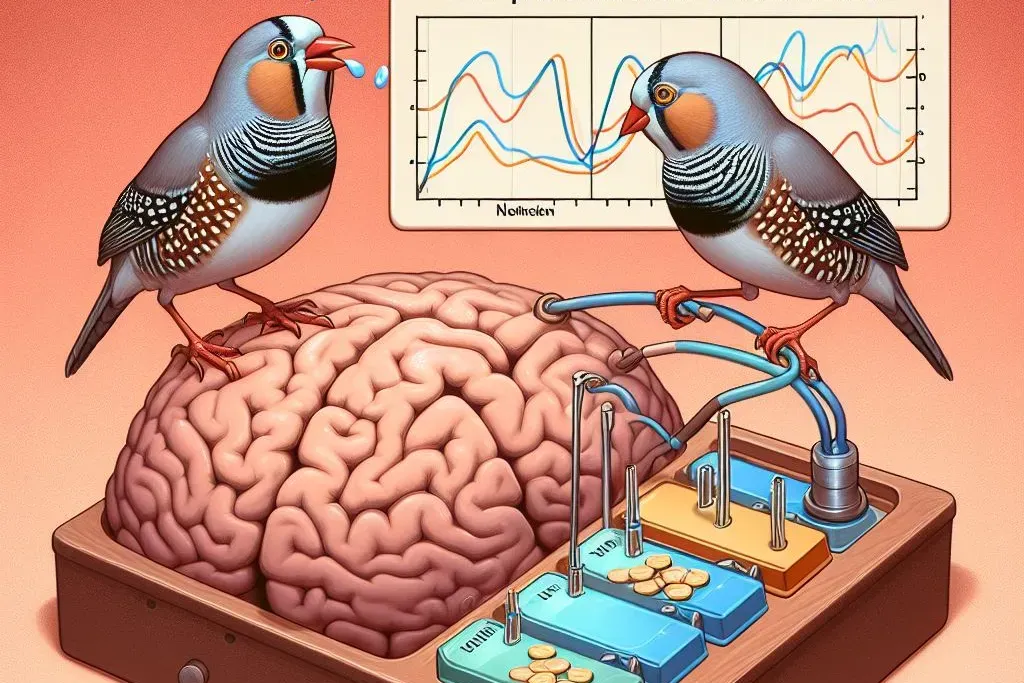Dopamine levels adapt to prioritize immediate needs, shifting focus from quenching thirst to courtship upon encountering a female.

A groundbreaking study published in Nature sheds light on the complex decision-making processes within the brain. Researchers at Cornell University employed advanced techniques to track the brain’s dopamine reward system, revealing its remarkable ability to adapt and prioritize needs when faced with competing desires.
The study observed lonely and thirsty male zebra finches encountering females. Interestingly, their thirst subsided as they shifted their focus towards the social interaction, highlighting the dopamine system’s dynamic response to varying needs.
Beyond expanding our understanding of the intricate interplay between dopamine and behavior, this discovery holds potential for informing the development of artificial intelligence that mimics these neural networks.
“Our unique approach, focused on how the brain navigates choices between multiple needs, rather than simply achieving a single goal.”
Jesse Goldberg, the study’s lead author
For over a century, scientists have explored the link between dopamine and learning. Dopamine neurons are activated by rewards that fulfill various needs, from hunger and thirst to social connection, language acquisition, and even musical skills. When a reward is received, such as water for a thirsty individual, these neurons fire in a burst of activity. Notably, all addictive drugs exploit this very system.
Researchers developed a novel technique employing optical recording and a specialized virus to track dopamine levels in the brains of zebra finches. This technique involved introducing fluorescent sensors for dopamine into the birds, allowing researchers to measure dopamine fluctuations as the birds engaged in various activities like singing, courting, and drinking water.
Previously, researchers could only monitor dopamine signals for 30 minutes using electrodes. This new method, however, enabled continuous monitoring for up to four hours over several weeks.

“This technical advancement was crucial for our discovery,” stated Jesse Goldberg, a researcher involved in the study.
In the experiments, male zebra finches, known for their social nature, were isolated and made thirsty. The birds were trained to associate a flashing light with water access. When alone, the cue triggered a surge in dopamine and the bird retrieved water. However, upon introducing a female, the male ignored the cue, and the dopamine signal dropped.
“It seems intuitive, but this study provided the first concrete evidence that courtship prioritization reduces thirst.”
Goldberg
“This finding is significant, as it highlights how priorities shift in response to new opportunities within a complex environment. The observed changes were evident both in the birds’ behavior and the dopamine signals, suggesting a dynamic interplay between brain activity and evolving needs.”
Abstract
Hunger, thirst, loneliness and ambition determine the reward value of food, water, social interaction and performance outcome1. Dopamine neurons respond to rewards meeting these diverse needs, but it remains unclear how behaviour and dopamine signals change as priorities change with new opportunities in the environment. One possibility is that dopamine signals for distinct drives are routed to distinct dopamine pathways. Another possibility is that dopamine signals in a given pathway are dynamically tuned to rewards set by the current priority. Here we used electrophysiology and fibre photometry to test how dopamine signals associated with quenching thirst, singing a good song and courting a mate change as male zebra finches (Taeniopygia guttata) were provided with opportunities to retrieve water, evaluate song performance or court a female. When alone, water reward signals were observed in two mesostriatal pathways but singing-related performance error signals were routed to Area X, a striatal nucleus specialized for singing. When courting a female, water seeking was reduced and dopamine responses to both water and song performance outcomes diminished. Instead, dopamine signals in Area X were driven by female calls timed with the courtship song. Thus the dopamine system handled coexisting drives by routing vocal performance and social feedback signals to a striatal area for communication and by flexibly re-tuning to rewards set by the prioritized drive.